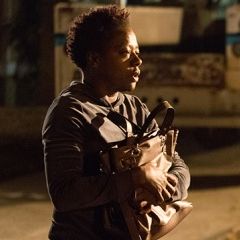
Lila & Eve is a film about mourning posing as a film about revenge. If you tried really hard, you could imagine it as yet another contemporary riff on Death Wish. And, to be fair, Viola Davis could probably do a hell of a job as a Charles Bronson–like angel of vengeance. But despite the trappings of violence and retribution and inner-city despair, this is not that movie.
Davis plays Lila, a mother grieving the death of her older son, Stephon (Aml Ameen) in a drive-by shooting near a local drug corner. When she joins a support group for the parents of murdered children, she meets Eve (Jennifer Lopez), a confident, elegant, tough-talking mother who gives voice to Lila’s own frustrations with the police and the other institutions around them. The cop investigating Stephon’s death (Shea Whigham) is helpless, a creature of procedure and habit. When Lila visits the police station, she peeks inside one office to see a full-on investigation of the death of a white girl; no such activity seems to have been dedicated to her innocent black son.
With nothing working out for them, Lila and Eve start to take the law into their own hands, questioning and methodically offing the people responsible for Stephon’s murder. You would expect the film at this point to fully embrace its thriller elements, as these women go deeper and deeper into this criminal underworld. And let’s be honest: Part of you wants to cheer these two maternal badasses on. But while it makes some feints in that direction, Lila & Eve remains admirably grounded in the world of loss. It continues to show us Lila contending with her grief; we never leave the support groups and sad family dinners and scattered pill bottles behind. To put it another way: Vengeance brings no consolation. (If anything, it complicates matters: At one point, the mother of two dealers she’s just killed joins the support group, fondly reminiscing about her loving kids.)
Lila & Eve is an awkward movie, though sometimes by design. There’s a twist near the end that you can probably see coming from a mile away. And the drug dealers and the cops talk like clichés, which might have worked in a film that ceded more ground to genre. But the film wants to be smarter than that, and it often is. The violence is neither glorified nor gritty. There’s a detached quality to the way director Charles Stone III (who once made the very promising Drumline and Paid in Full) films those moments: You might expect him to play up the immediacy, to give us the horror of these two seemingly ordinary women suddenly finding themselves in the midst of such madness. But the shootings happen quickly, unremarkably — as if they were the logical conclusion of each exchange rather than its disruption.
That at first also feels like a mistake. If the grief is so visceral, why isn’t the violence? But there, Stone plays a long game. To satisfy us, or even to horrify us, would be to compromise the film’s morality and compassion. So he focuses as much as he can on Davis, pulling in close to her, letting her quiet pain do the talking. Not a bad move. The actress probably has the most expressive eyes of any actor working today, and her face tells the real story of the film: It speaks to us not so much of fury, but of regret and grief. Lila is a haunted woman, in more ways than one, and so is this movie.





